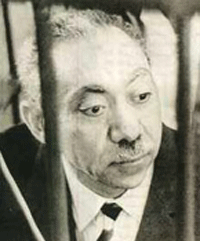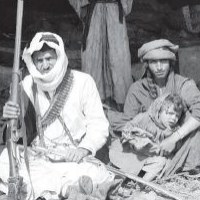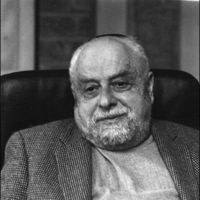Published: march 23, 2003; The New York Times Magazine. Paul Berman is the author of the book ”Terror and Liberalism” (W.W. Norton), from which this essay (republished in 3 parts) is adapted. You can read part 1 here en part 2 here.
by Paul Berman
”To exterminate” — that was Qutb’s phrase. Hysteria cried out from every syllable. But he did not want to be hysterical. He wanted to respond. How?
That one question dominated Qutb’s life. It was a theological question, and he answered it with his volumes on the Koran. But he intended his theology to be practical too — to offer a revolutionary program to save mankind. The first step was to open people’s eyes. He wanted Muslims to recognize the nature of the danger — to recognize that Islam had come under assault from outside the Muslim world and also from inside the Muslim world. The assault from outside was led by Crusaders and world Zionism (though sometimes he also mentioned Communism).
But the assault from inside was conducted by Muslims themselves — that is, by people who called themselves Muslims but who polluted the Muslim world with incompatible ideas derived from elsewhere. These several enemies, internal and external, the false Muslims together with the Crusaders and Zionists, ruled the earth. But Qutb considered that Islam’s strength was, even so, huger yet. ”We are certain,” he wrote, ”that this religion of Islam is so intrinsically genuine, so colossal and deeply rooted that all such efforts and brutal concussions will avail nothing.”
Islam’s apparent weakness was mere appearance. Islam’s true champions seemed to be few, but numbers meant nothing. The few had to gather themselves together into what Qutb in ”Milestones” called a vanguard — a term that he must have borrowed from Lenin, though Qutb had in mind a tiny group animated by the spirit of Muhammad and his Companions from the dawn of Islam. This vanguard of true Muslims was going to undertake the renovation of Islam and of civilization all over the world. The vanguard was going to turn against the false Muslims and ”hypocrites” and do as Muhammad had done, which was to found a new state, based on the Koran. And from there, the vanguard was going to resurrect the caliphate and take Islam to all the world, just as Muhammad had done.

Qutb’s vanguard was going to reinstate shariah, the Muslim code, as the legal code for all of society. Shariah implied some fairly severe rules. Qutb cited the Koran on the punishments for killing or wounding: ”a life for a life, an eye for an eye, a nose for a nose, an ear for an ear.” Fornication, too, was a serious crime because, in his words, ”it involves an attack on honor and a contempt for sanctity and an encouragement of profligacy in society.” Shariah specified the punishments here as well. ”The penalty for this must be severe; for married men and women it is stoning to death; for unmarried men and women it is flogging, a hundred lashes, which in cases is fatal.” False accusations were likewise serious. ”A punishment of 80 lashes is fixed for those who falsely accuse chaste women.” As for those who threaten the general security of society, their punishment is to be put to death, to be crucified, to have their hands and feet cut off, or to be banished from the country.”
But Qutb refused to regard these punishments as barbarous or primitive. Shariah, in his view, meant liberation. Other societies, drawing on non-Koranic principles, forced people to obey haughty masters and man-made law. Those other societies forced people to worship their own rulers and to do as the rulers said — even if the rulers were democratically chosen. Under shariah, no one was going to be forced to obey mere humans. Shariah, in Qutb’s view, meant ”the abolition of man-made laws.” In the resurrected caliphate, every person was going to be ”free from servitude to others.” The true Islamic system meant ”the complete and true freedom of every person and the full dignity of every individual of the society. On the other hand, in a society in which some people are lords who legislate and some others are slaves who obey, then there is no freedom in the real sense, nor dignity for each and every individual.”
He insisted that shariah meant freedom of conscience — though freedom of conscience, in his interpretation, meant freedom from false doctrines that failed to recognize God, freedom from the modern schizophrenia. Shariah, in a word, was utopia for Sayyid Qutb. It was perfection. It was the natural order in the universal. It was freedom, justice, humanity and divinity in a single system. It was a vision as grand or grander than Communism or any of the other totalitarian doctrines of the 20th century. It was, in his words, ”the total liberation of man from enslavement by others.” It was an impossible vision — a vision that was plainly going to require a total dictatorship in order to enforce: a vision that, by claiming not to rely on man-made laws, was going to have to rely, instead, on theocrats, who would interpret God’s laws to the masses. The most extreme despotism was all too visible in Qutb’s revolutionary program. That much should have been obvious to anyone who knew the history of the other grand totalitarian revolutionary projects of the 20th century, the projects of the Nazis, the Fascists and the Communists.
Still, for Qutb, utopia was not the main thing. Utopia was for the future, and Qutb was not a dreamer. Islam, in his interpretation, was a way of life. He wanted his Muslim vanguard to live according to pious Islamic principles in the here and now. He wanted the vanguard to observe the rules of Muslim charity and all the other rules of daily life. He wanted the true Muslims to engage in a lifelong study of the Koran — the lifelong study that his own gigantic commentary was designed to enhance. But most of all, he wanted his vanguard to accept the obligations of ”jihad,” which is to say, the struggle for Islam. And what would that mean, to engage in jihad in the present and not just in the sci-fi utopian future?
Qutb began Volume 1 of ”In the Shade of the Qur’an” by saying: ”To live ‘in the shade of the Qur’an’ is a great blessing which can only be fully appreciated by those who experience it. It is a rich experience that gives meaning to life and makes it worth living. I am deeply thankful to God Almighty for blessing me with this uplifting experience for a considerable time, which was the happiest and most fruitful period of my life — a privilege for which I am eternally grateful.”
He does not identify that happy and fruitful period of his life — a period that lasted, as he says, a considerable time. Perhaps his brother and other intimates would have known exactly what he had in mind — some very pleasant period, conceivably the childhood years when he was memorizing the Koran. But an ordinary reader who picks up Qutb’s books can only imagine that he was writing about his years of torture and prison.
One of his Indian publishers has highlighted this point in a remarkably gruesome manner by attaching an unsigned preface to a 1998 edition of ”Milestones.” The preface declares: ”The ultimate price for working to please God Almighty and to propagate his ways in this world is often one’s own life. The author” — Qutb, that is — ”tried to do it; he paid for it with his life. If you and I try to do it, there is every likelihood we will be called upon to do the same. But for those who truly believe in God, what other choice is there?”
You are meant to suppose that a true reader of Sayyid Qutb is someone who, in the degree that he properly digests Qutb’s message, will act on what has been digested. And action may well bring on a martyr’s death. To read is to glide forward toward death; and gliding toward death means you have understood what you are reading. Qutb’s writings do vibrate to that morbid tone — not always, but sometimes. The work that he left behind, his Koranic commentary, is vast, vividly written, wise, broad, indignant, sometimes demented, bristly with hatred, medieval, modern, tolerant, intolerant, paranoid, cruel, urgent, cranky, tranquil, grave, poetic, learned and analytic. Sometimes it is moving. It is a work large and solid enough to create its own shade, where Qutb’s vanguard and other readers could repose and turn his pages, as he advised the students of the Koran to do, in the earnest spirit of loyal soldiers reading their daily bulletin. But there is, in this commentary, something otherworldly too — an atmosphere of death. At the very least, it is impossible to read the work without remembering that, in 1966, Qutb, in the phrase of one of his biographers, ”kissed the gallows.”
Martyrdom was among his themes. He discusses passages in the Koran’s sura ”The Cow,” and he explains that death as a martyr is nothing to fear. Yes, some people will have to be sacrificed. ”Those who risk their lives and go out to fight, and who are prepared to lay down their lives for the cause of God are honorable people, pure of heart and blessed of soul. But the great surprise is that those among them who are killed in the struggle must not be considered or described as dead. They continue to live, as God Himself clearly states.”
Qutb wrote: ”To all intents and purposes, those people may very well appear lifeless, but life and death are not judged by superficial physical means alone. Life is chiefly characterized by activity, growth and persistence, while death is a state of total loss of function, of complete inertia and lifelessness. But the death of those who are killed for the cause of God gives more impetus to the cause, which continues to thrive on their blood. Their influence on those they leave behind also grows and spreads. Thus after their death they remain an active force in shaping the life of their community and giving it direction. It is in this sense that such people, having sacrificed their lives for the sake of God, retain their active existence in everyday life. . . .
”There is no real sense of loss in their death, since they continue to live.”
And so it was with Sayyid Qutb. In the period before his final arrest and execution, diplomats from Iraq and Libya offered him the chance to flee to safety in their countries. But he declined to go, on the ground that 3,000 young men and women in Egypt were his followers, and he did not want to undo a lifetime of teaching by refusing to give those 3,000 people an example of true martyrdom. And, in fact, some of those followers went on to form the Egyptian terrorist movement in the next decade, the 1970’s — the groups that massacred tourists and Coptic Christians and that assassinated Egypt’s president, Anwar Sadat, after he made peace with Israel; the groups that, in still later years, ended up merging with bin Laden’s group and supplying Al Qaeda with its fundamental doctrines. The people in those groups were not stupid or lacking in education.
On the contrary, we keep learning how well educated these people are, how many of them come from the upper class, how wealthy they are. And there is no reason for us to be surprised. These people are in possession of a powerful philosophy, which is Sayyid Qutb’s. They are in possession of a gigantic work of literature, which is his ”In the Shade of the Qur’an.” These people feel that, by consulting their own doctrines, they can explain the unhappiness of the world. They feel that, with an intense study of the Koran, as directed by Qutb and his fellow thinkers, they can make sense of thousands of years of theological error. They feel that, in Qutb’s notion of shariah, they command the principles of a perfect society.
These people believe that, in the entire world, they alone are preserving Islam from extinction. They feel they are benefiting the world, even if they are committing random massacres. They are certainly not worried about death. Qutb gave these people a reason to yearn for death. Wisdom, piety, death and immortality are, in his vision of the world, the same. For a pious life is a life of struggle or jihad for Islam, and struggle means martyrdom. We may think: those are creepy ideas. And yes, the ideas are creepy. But there is, in Qutb’s presentation, a weird allure in those ideas.
It would be nice to think that, in the war against terror, our side, too, speaks of deep philosophical ideas — it would be nice to think that someone is arguing with the terrorists and with the readers of Sayyid Qutb. But here I have my worries. The followers of Qutb speak, in their wild fashion, of enormous human problems, and they urge one another to death and to murder. But the enemies of these people speak of what? The political leaders speak of United Nations resolutions, of unilateralism, of multilateralism, of weapons inspectors, of coercion and noncoercion. This is no answer to the terrorists. The terrorists speak insanely of deep things. The antiterrorists had better speak sanely of equally deep things. Presidents will not do this. Presidents will dispatch armies, or decline to dispatch armies, for better and for worse.
But who will speak of the sacred and the secular, of the physical world and the spiritual world? Who will defend liberal ideas against the enemies of liberal ideas? Who will defend liberal principles in spite of liberal society’s every failure? President George W. Bush, in his speech to Congress a few days after the Sept. 11, 2001, attacks, announced that he was going to wage a war of ideas. He has done no such thing. He is not the man for that.
Philosophers and religious leaders will have to do this on their own. Are they doing so? Armies are in motion, but are the philosophers and religious leaders, the liberal thinkers, likewise in motion? There is something to worry about here, an aspect of the war that liberal society seems to have trouble understanding — one more worry, on top of all the others, and possibly the greatest worry of all.
Mazzeltov,
Crethi Plethi



 RSS
RSS











[…] Berman ”To exterminate” — that was Qutb’s phrase. Hysteria cried out from every syllable. Read More »google_ad_client = "pub-3667441628576694"; google_alternate_color = "FFFFFF"; google_ad_width = 728; […]
[…] Published: march 23, 2003; The New York Times Magazine. Paul Berman is the author of the book ”Terror and Liberalism” (W.W. Norton), from which this essay (republished in 3 parts) is adapted. You can read part 2 here en part 3 here. […]